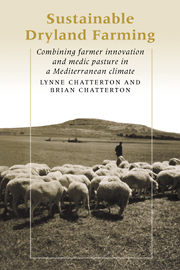 Sustainable Dryland Farming
Sustainable Dryland Farming 2 - Farming in South Australia before medic
Published online by Cambridge University Press: 22 September 2009
Summary
Introduction
The farmers who came to South Australia from England in 1836 and later were forced to discover new ways of tilling the soil, harvesting cereals and keeping livestock.
Robert Chambers has argued that the experience together with the common sense and innate wisdom of farmers should be acknowledged and used by those who plan and operate farming projects in the developing world. Chambers has written scornfully of the ‘development tourist’ – the technical expert armed with a diploma or degree in agricultural science who goes from development projects in one climatic zone to another, emerging from each as an ‘expert’ on yet another aspect of Third World agriculture – and claims that this is a major reason why many projects destroy ratherthan improve the existing agricultural resource (Chambers, 1983).
The other side of that argument is put by Dr. P.E. Cocks (formerly responsible for the pasture research program at ICARDA in Syria and consultant to a number of Australian dryland farming projects in North Africa and the Near East). A propos of the suggestion that Australian farmers were better at transferring the knowledge of their medic farming system to Arab farmers than technical experts he said that ‘Australian farmers are no better at understanding (the farming system) than Australian scientists…. There is no brotherhood of farmers and the sooner we get rid of this idea the better’ (Springborg, 1985, p. 26).
- Type
- Chapter
- Information
- Sustainable Dryland FarmingCombining Farmer Innovation and Medic Pasture in a Mediterranean Climate, pp. 32 - 61Publisher: Cambridge University PressPrint publication year: 1996


